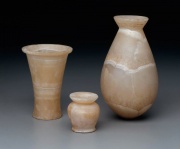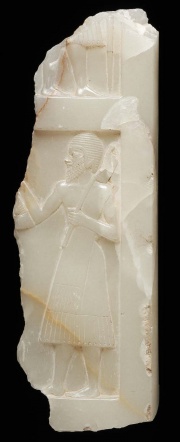Difference between revisions of "Alabaster"
(→Additional Information: link to oddy test wiki) |
|||
| Line 41: | Line 41: | ||
B.Aston, J.Harrell, I.Shaw, "Stone" in ''Ancient Egyptian Materials and Technology'', P.Nicholson, I.Shaw (eds.), Cambridge University Press, 2000, p. 21-22. | B.Aston, J.Harrell, I.Shaw, "Stone" in ''Ancient Egyptian Materials and Technology'', P.Nicholson, I.Shaw (eds.), Cambridge University Press, 2000, p. 21-22. | ||
| + | |||
| + | '''Links to Oddy Test results posted on AIC Wiki Materials Database Pages for individual materials below''' | ||
| + | |||
| + | ° [http://www.conservation-wiki.com/wiki/Oddy_Test_Results:_Case_Construction_Materials#Alabaster0001 Alabaster] tested in 2008 | ||
== Sources Checked for Data in Record == | == Sources Checked for Data in Record == | ||
Revision as of 15:35, 28 May 2018
Description
Fine grained, compact variety of Gypsum (hydrated calcium sulfate), usually white or pale colored and translucent. Alabaster is soft and can be scratched slightly with a fingernail. It also dissolves slowly in wet environments. Alabaster was used since ancient times in the Iran, Pakistan, Egypt, Greece, Algeria, Tunisia, and Italy for ornamental building work, sculpture, vases, and small decorative carvings. Powdered alabaster has been used as a paper filler and paint pigment called mineral white or terra alba.
The word alabaster is derived from the Greek word for substance. In ancient times, it was used to refer to several other minerals such as Limestone onyx, Travertine and Calcite.
See also Egyptian alabaster.
Synonyms and Related Terms
gypsum; satin spar; alabastrine; Alabaster (Deut., Pol., Sven.); alabastro (Esp., It., Port.); albâtre (Fr.); albast (Ned.)
Other Properties
Slightly soluble in water.
Monoclinic crystal system. Fibrous. Cleavage is good in one direction.
Streak is white.
| Composition | CaSO4.2H2O |
|---|---|
| Mohs Hardness | 1.5 - 2.0 |
| Density | 2.31-2.33 |
Hazards and Safety
May be damaged by water and abrasion.
Additional Information
B.Aston, J.Harrell, I.Shaw, "Stone" in Ancient Egyptian Materials and Technology, P.Nicholson, I.Shaw (eds.), Cambridge University Press, 2000, p. 21-22.
Links to Oddy Test results posted on AIC Wiki Materials Database Pages for individual materials below
° Alabaster tested in 2008
Sources Checked for Data in Record
- A.Lucas, J.R.Harris, Ancient Egyptian Materials and Industries, Edward Arnold Publishers Ltd., London, 4th edition, 1962
- The Dictionary of Art, Grove's Dictionaries Inc., New York, 1996 Comment: 'Alabaster'
- Janet Burnett Grossman, Looking at Greek and Roman Sculpture in Stone, J. Paul Getty Trust, Los Angeles, 2003
- Ralph Mayer, A Dictionary of Art Terms and Techniques, Harper and Row Publishers, New York, 1969 (also 1945 printing)
- Sue Fuller, Rocks and Minerals, DK Publishing, Inc., New York City, 1995
- Jack Odgen, Jewellery of the Ancient World, Rizzoli International Publications Inc., New York City, 1982
- G.S.Brady, Materials Handbook, McGraw-Hill Book Co., New York, 1971 Comment: p. 386
- Wikipedia, the free encyclopedia, at http://www.wikipedia.com Comment: http://en.wikipedia.org/wiki/Alabaster (Accessed Mar. 1, 2006) -for non-English terms
- CRC Handbook of Chemistry and Physics, Robert Weast (ed.), CRC Press, Boca Raton, Florida, v. 61, 1980 Comment: density=2.26-2.32
- Susan E. Schur, Conservation Terminology: A review of Past & Current Nomenclature of Materials, Technology and Conservation, Spring (p.34-39); Summer (p.35-38); Fall (p.25-36), 1985
- Tom Rowland, Noel Riley, A-Z Guide to Cleaning, Conserving and Repairing Antiques, Constable and Co., Ltd., London, 1981
- Michael McCann, Artist Beware, Watson-Guptill Publications, New York City, 1979
- Random House, Webster's Encyclopedic Unabridged Dictionary of the English Language, Grammercy Book, New York, 1997
- The American Heritage Dictionary or Encarta, via Microsoft Bookshelf 98, Microsoft Corp., 1998

